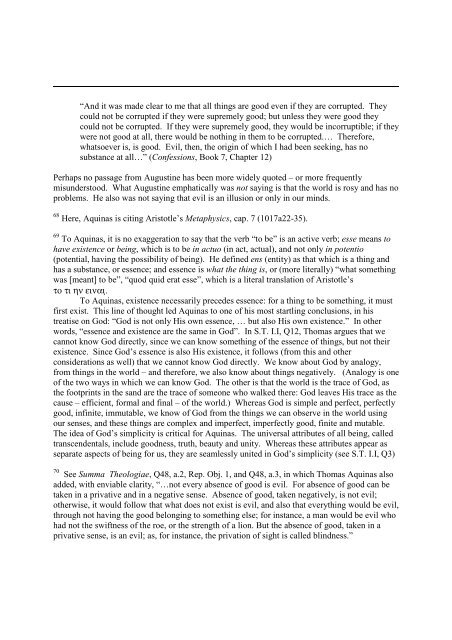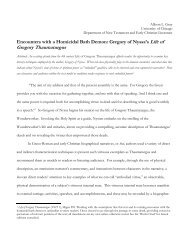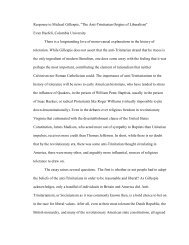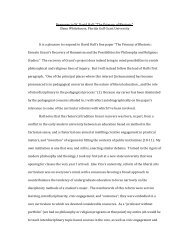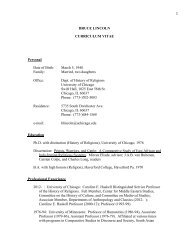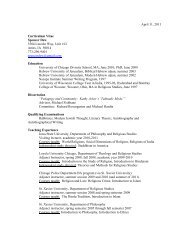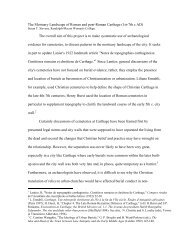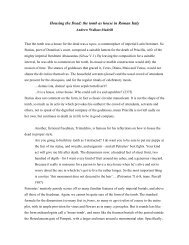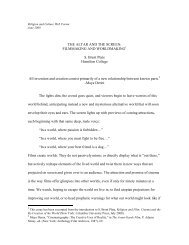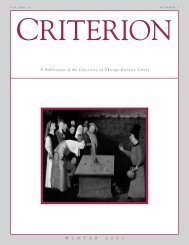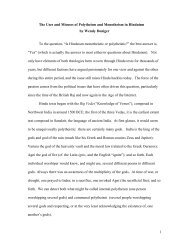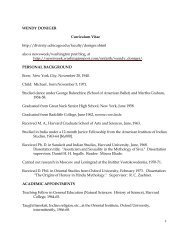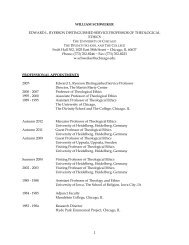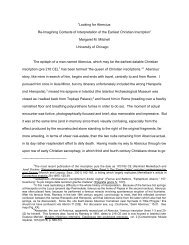The Reification of Evil and The Failure of Theodicy: The Devil in ...
The Reification of Evil and The Failure of Theodicy: The Devil in ...
The Reification of Evil and The Failure of Theodicy: The Devil in ...
You also want an ePaper? Increase the reach of your titles
YUMPU automatically turns print PDFs into web optimized ePapers that Google loves.
“And it was made clear to me that all th<strong>in</strong>gs are good even if they are corrupted. <strong>The</strong>y<br />
could not be corrupted if they were supremely good; but unless they were good they<br />
could not be corrupted. If they were supremely good, they would be <strong>in</strong>corruptible; if they<br />
were not good at all, there would be noth<strong>in</strong>g <strong>in</strong> them to be corrupted.… <strong>The</strong>refore,<br />
whatsoever is, is good. <strong>Evil</strong>, then, the orig<strong>in</strong> <strong>of</strong> which I had been seek<strong>in</strong>g, has no<br />
substance at all…” (Confessions, Book 7, Chapter 12)<br />
Perhaps no passage from August<strong>in</strong>e has been more widely quoted – or more frequently<br />
misunderstood. What August<strong>in</strong>e emphatically was not say<strong>in</strong>g is that the world is rosy <strong>and</strong> has no<br />
problems. He also was not say<strong>in</strong>g that evil is an illusion or only <strong>in</strong> our m<strong>in</strong>ds.<br />
68 Here, Aqu<strong>in</strong>as is cit<strong>in</strong>g Aristotle’s Metaphysics, cap. 7 (1017a22-35).<br />
69 To Aqu<strong>in</strong>as, it is no exaggeration to say that the verb “to be” is an active verb; esse means to<br />
have existence or be<strong>in</strong>g, which is to be <strong>in</strong> actuo (<strong>in</strong> act, actual), <strong>and</strong> not only <strong>in</strong> potentio<br />
(potential, hav<strong>in</strong>g the possibility <strong>of</strong> be<strong>in</strong>g). He def<strong>in</strong>ed ens (entity) as that which is a th<strong>in</strong>g <strong>and</strong><br />
has a substance, or essence; <strong>and</strong> essence is what the th<strong>in</strong>g is, or (more literally) “what someth<strong>in</strong>g<br />
was [meant] to be”, “quod quid erat esse”, which is a literal translation <strong>of</strong> Aristotle’s<br />
το τι ην ειναι.<br />
To Aqu<strong>in</strong>as, existence necessarily precedes essence: for a th<strong>in</strong>g to be someth<strong>in</strong>g, it must<br />
first exist. This l<strong>in</strong>e <strong>of</strong> thought led Aqu<strong>in</strong>as to one <strong>of</strong> his most startl<strong>in</strong>g conclusions, <strong>in</strong> his<br />
treatise on God: “God is not only His own essence, … but also His own existence.” In other<br />
words, “essence <strong>and</strong> existence are the same <strong>in</strong> God”. In S.T. I.I, Q12, Thomas argues that we<br />
cannot know God directly, s<strong>in</strong>ce we can know someth<strong>in</strong>g <strong>of</strong> the essence <strong>of</strong> th<strong>in</strong>gs, but not their<br />
existence. S<strong>in</strong>ce God’s essence is also His existence, it follows (from this <strong>and</strong> other<br />
considerations as well) that we cannot know God directly. We know about God by analogy,<br />
from th<strong>in</strong>gs <strong>in</strong> the world – <strong>and</strong> therefore, we also know about th<strong>in</strong>gs negatively. (Analogy is one<br />
<strong>of</strong> the two ways <strong>in</strong> which we can know God. <strong>The</strong> other is that the world is the trace <strong>of</strong> God, as<br />
the footpr<strong>in</strong>ts <strong>in</strong> the s<strong>and</strong> are the trace <strong>of</strong> someone who walked there: God leaves His trace as the<br />
cause – efficient, formal <strong>and</strong> f<strong>in</strong>al – <strong>of</strong> the world.) Whereas God is simple <strong>and</strong> perfect, perfectly<br />
good, <strong>in</strong>f<strong>in</strong>ite, immutable, we know <strong>of</strong> God from the th<strong>in</strong>gs we can observe <strong>in</strong> the world us<strong>in</strong>g<br />
our senses, <strong>and</strong> these th<strong>in</strong>gs are complex <strong>and</strong> imperfect, imperfectly good, f<strong>in</strong>ite <strong>and</strong> mutable.<br />
<strong>The</strong> idea <strong>of</strong> God’s simplicity is critical for Aqu<strong>in</strong>as. <strong>The</strong> universal attributes <strong>of</strong> all be<strong>in</strong>g, called<br />
transcendentals, <strong>in</strong>clude goodness, truth, beauty <strong>and</strong> unity. Whereas these attributes appear as<br />
separate aspects <strong>of</strong> be<strong>in</strong>g for us, they are seamlessly united <strong>in</strong> God’s simplicity (see S.T. I.I, Q3)<br />
70 See Summa <strong>The</strong>ologiae, Q48, a.2, Rep. Obj. 1, <strong>and</strong> Q48, a.3, <strong>in</strong> which Thomas Aqu<strong>in</strong>as also<br />
added, with enviable clarity, “…not every absence <strong>of</strong> good is evil. For absence <strong>of</strong> good can be<br />
taken <strong>in</strong> a privative <strong>and</strong> <strong>in</strong> a negative sense. Absence <strong>of</strong> good, taken negatively, is not evil;<br />
otherwise, it would follow that what does not exist is evil, <strong>and</strong> also that everyth<strong>in</strong>g would be evil,<br />
through not hav<strong>in</strong>g the good belong<strong>in</strong>g to someth<strong>in</strong>g else; for <strong>in</strong>stance, a man would be evil who<br />
had not the swiftness <strong>of</strong> the roe, or the strength <strong>of</strong> a lion. But the absence <strong>of</strong> good, taken <strong>in</strong> a<br />
privative sense, is an evil; as, for <strong>in</strong>stance, the privation <strong>of</strong> sight is called bl<strong>in</strong>dness.”


